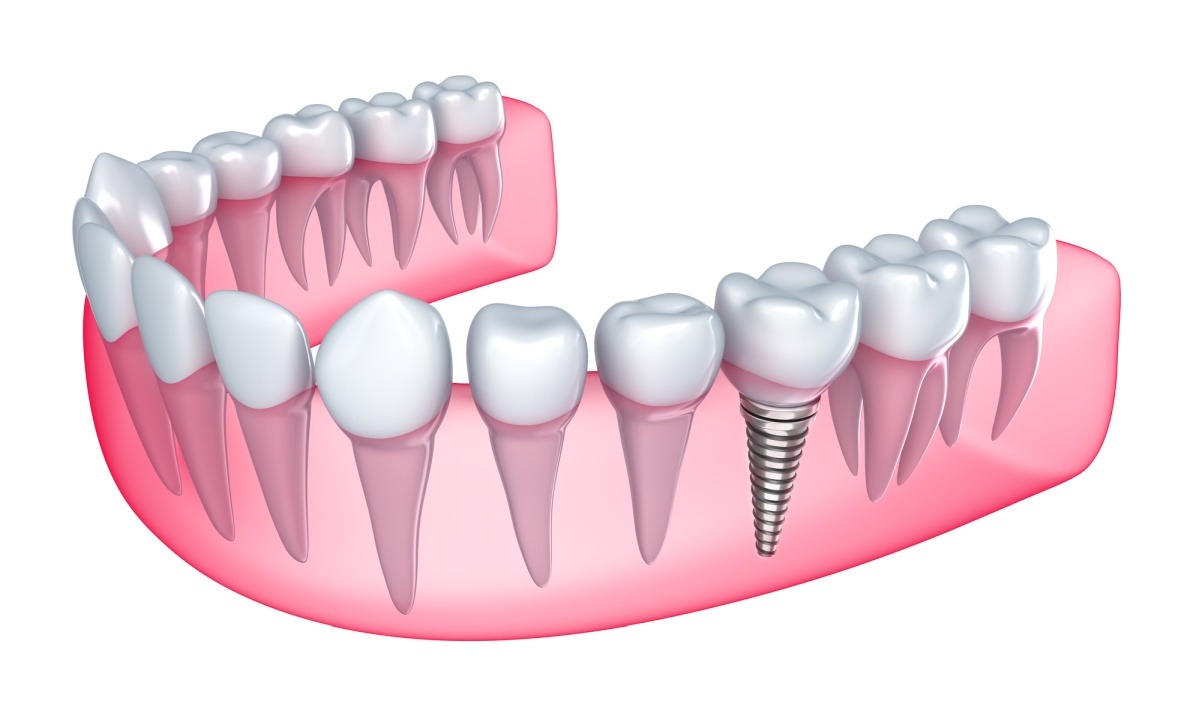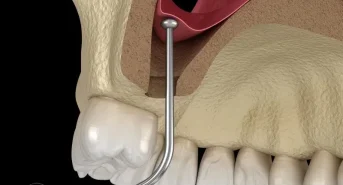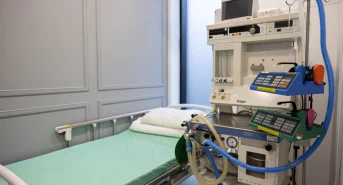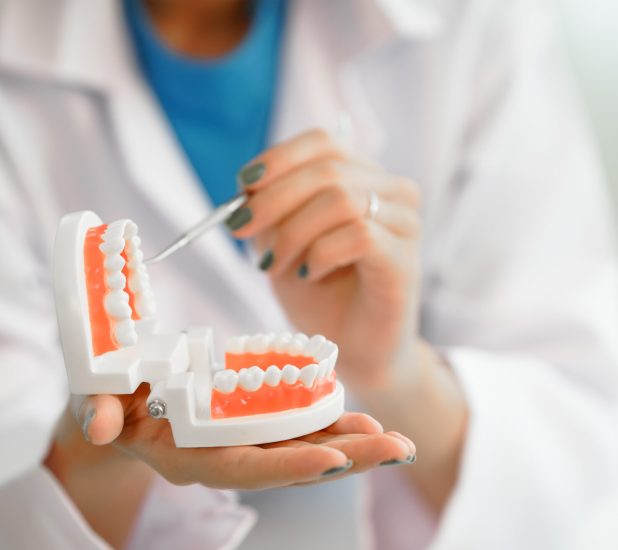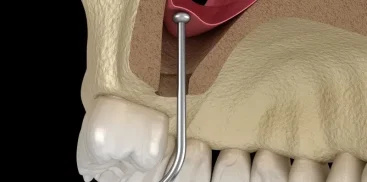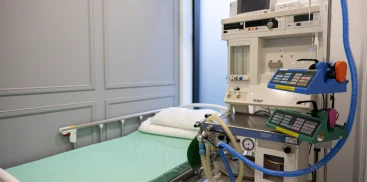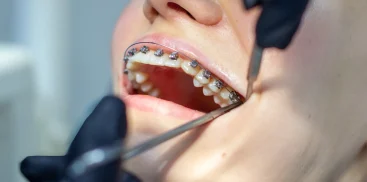Many people dream of a beautiful and healthy smile. Unfortunately, some people struggle with inconveniences that prevent them from laughing, eating, or even speaking freely. Constant pain, discomfort, dental problems or their absence can make everyday life very difficult and cause complexes.
Fortunately, there is a method by which you can solve these inconveniences.
For this purpose, a special science was created that deals with the reconstruction of diseased or damaged teeth – implantology. Dentists who specialize in it construct implants, i.e. artificial roots that look just like natural teeth. This way, even people who have lost hope of smiling freely can enjoy new and durable teeth.
What is a dental implant?
A dental implant is an artificial root in the shape of a screw, which is most often made of titanium.
The purpose of inserting such a substitute is to replace a natural tooth that has decayed, fallen out or been mechanically damaged. Treating and filling cavities is important not only because of their aesthetic value. First of all, it saves the teeth, eliminates the development of other potential diseases and significantly reduces discomfort.
What should you consider when choosing dental implants?
Choosing implants is an investment for many years. The artificial root is extremely durable and is designed to attach a dental crown in place of a lost natural tooth. When choosing implants, it is worth considering your health and comfort first and foremost. If your teeth are decayed, weak or damaged, this investment can improve their condition and prevent further negative changes.
Appearance and aesthetics are also important. If weak and brittle teeth cause complexes, the main criterion guided by patients will certainly be visual values.
Replacing gaps in natural teeth has a huge impact on your well-being and self-confidence.
It’s also an investment in your mental health, which is worth any price.
Benefits of having implants inserted
The advantages of implants are undeniable. They significantly improve the patient’s oral health, which results in improved quality of life and everyday functioning.
The benefits of having implants include:
- Preventing bone loss and the progression of negative changes in the teeth,
- A chance for a beautiful, healthy smile,
- Peace of mind, stability and comfort ensured for many years of use,
- Strength and resistance to thermal conditions,
- Avoiding the need to wear dentures,
- Aesthetic and natural effect.
- Types of dental implants – which solution should you choose?
There are different types of implants. Their choice should be consulted with a dentist who specializes in implantology. He chooses the most appropriate treatment method and type of artificial roots for the patient.
Titanium implants and zirconium implants
Titanium implants are by far the most popular and most frequently used in dentistry.
Their advantage is their great durability, which allows for a long period of easy use.
Zirconium implants can replace a lost tooth root. In terms of color, they are more similar to the natural color of the teeth and, just like the model made of titanium, they are characterized by incredible durability and high resistance to temperature and mechanical damage.
Single-phase implants and two-phase implants
The classic two-phase option consists of a titanium screw and a connector.
This treatment is more complicated and takes much longer. In the case of a two-phase implant, the first phase is screwing the screw into the jaw bone. The procedure is performed under local anesthesia and lasts – depending on the number of intraosseous implants implanted – from half to two hours.
Endosseous implants fuse with the bones for approximately three to six months, after which the second phase can begin – replacing the screw with a healing screw. After the wound has healed, dentures are attached to the tooth we or crowns.
Ossointegration, i.e. the fusion of the implant with the surrounding bone tissue, lasts from 3 to 4 months in the case of dental implants implanted in the mandible, and from 5 to 6 months if the implant is located in the jaw. Titanium implants quickly integrate with the gum tissue of the remaining teeth.
Immediately after the insertion of intraosseous implants, the patient may experience slight pain, which disappears three days after the procedure.
Immediately after dental implants, you should avoid heavy exertion, such as lifting heavy objects, bending sharply and straightening. Doctors also recommend refraining from practicing sports for the next 2-3 weeks.
If swelling and swelling occurs after the treatment, a cold compress may be applied to the sore area.
On the day when temporary implants are implanted, it is recommended to drink lukewarm or cold liquids and avoid hard foods. During the first week after dental implants, it is advisable to eat soups and soft products. However, you should avoid drinking alcohol and smoking cigarettes.
The implantation of single-phase implants takes much less time.
One-piece implants inserted in place of a lost tooth are immediately closed with a healing screw protruding from the gum. This makes it possible to immediately insert prosthetic bridges, single crowns or the entire denture. During the procedure, there is no need to cut the gum, and there is little space left between the implant and the crown, which prevents possible problems resulting from loosening of individual tooth reconstruction elements.
If a patient has lost natural teeth and lacks dental alveolar bone, it may be necessary to perform a sinus lift procedure, called a “sinus lift”, prior to the implantation of implants. During the procedure, the doctor shapes the sinus membrane, which allows it to be restored to its original position and create space for restoration bone formation its equivalent.Replacing the gap with the appropriate amount of material allows for stable implantation and replacement of natural teeth with a prosthetic crown or bridge.
Implantation – course of the procedure
Many people associate the procedure of inserting implants into the oral cavity with pain, which is why they give up this option. However, thanks to the high qualifications of dentists and the use of the latest treatment methods, inserting implants is no longer as painful and complicated as it was several years ago. However, it is worth remembering that this is a surgical intervention for which you need to be properly prepared.
The course of the procedure may vary in individual cases, as it depends on many factors, including:
the type of implants used.
The process looks like this:
- Consultation and detailed interview conducted by a dentist,
- 3D computed tomography, dental examination and general diagnostics of the patient’s health,
- Establishing a treatment plan and having the patient sign a consent to the procedure.
Starting the treatment:
- Incision of the gum, drilling a hole in the bone, implantation and suturing the wound,
- Exposing the wound and screwing in a special healing screw,
- Fixing the crown on the implant.
- Does inserting dental implants hurt?
The treatment during which the dentist inserts dental implants is usually performed under local anesthesia.
This means that the pain is significantly reduced and practically unnoticeable.
Inserting implants is a surgical procedure that should only be performed in professional and sterile conditions in a dental office.
After the visit, the patient should take special care of oral hygiene and regularly attend check-ups with the dentist.
Implants – how much do they cost and are they worth investing in?
Is it worth investing large sums of money in implants? They are among the most expensive treatments in dentistry. Their cost can reach up to several thousand zlotys and depends on the degree of complexity case and the value of the materials used. For many people, such an expense seems too high and impossible to achieve. If the price of implants discourages you, it is worth remembering that the purpose of implanting them is primarily to improve the health of the oral cavity, which significantly translates into the quality of everyday life. Fortunately, over the last dozen or so years, dental implants have become much more popular, and as a result, their price has decreased significantly.
Nowadays, more and more people suffering from poor dental condition can use implantology and enjoy its effects.
Situations in which dental implants are not recommended
Contraindications occur in a small group of patients – these are people who suffer from various types of bone diseases (e.g. osteoporosis), periodontitis or poorly controlled diabetes, which may cause wound healing to be much slower. It should be borne in mind that permanent implants are an option that can be used by adults, as the condition for the procedure is the proper bone development of the body and the completed process of jaw bone growth. Pregnant women should also refrain from this type of treatment at this time to avoid unwanted effects that may be caused by dental implants.
Complications that may occur after the procedure include:
swelling, edema, toothache and fever. If any disturbing symptoms occur, please contact your dentist immediately. It is important to remember that the implant is a foreign body and there is a risk of complications and rejection by the body; however, this happens very rarely. The most common cause of allergic reactions may be an allergy to titanium. If we suspect such a problem, it is worth performing allergy tests before deciding to implant the implant.
How to care for dental implants?
Typical dental implants are resistant to external factors Some oral diseases, such as caries and dental pulp inflammation, or bacteria, do not demineralize under the influence of acids, nor are they hypersensitive to cold and warm foods. However, this does not mean that you do not need to take proper care of their hygiene.
In the case of titanium or zirconium implants, it is necessary:
- brushing your teeth at least twice a day, preferably after each meal;
- rinsing the mouth with special antiseptic fluids;
- cleaning interdental spaces using dental floss;
- checking the condition of the implant twice a year with an implantologist;
- systematic removal of tartar (scaling).
After implantation, it is also worth considering quitting smoking, which negatively affects the osseointegration process and significantly increases the risk of peri-implantitis – inflammation of the peri-implantation tissue.
I already have dental implants – are there any symptoms that should concern me?
Symptoms that may worry a patient after implantation include:
- severe, recurrent pain in the mouth despite taking medications;
- numbness appearing around the operated region;
- bleeding occurring at the surgical site or associated structures;
- pain in the tooth adjacent to the surgical site;
- difficulty swallowing;
- sore throat, swollen lymph nodes and nosebleeds;
- swelling or purulent discharge appearing in the surgical site.
If any of the above symptoms occur, you should go to the specialist who implanted the implant as soon as possible and check what may be causing the problems.
Warsaw Dental Center – professional dental clinic
An implant is an innovative way to achieve a beautiful and healthy smile.
Professional treatment allows patients to once again enjoy freedom and comfort for many years.
The Warsaw Dental Center dental clinic specializes in the insertion of dental implants ntion of satisfaction and well-being. The Warsaw Dental Center staff consists of specialists from many fields whose common passion is the highest quality dental treatment. In an intimate and friendly atmosphere, we do everything to ensure that each of our patients is satisfied with the final effects of treatment.
Our mission is to provide a comprehensive offer, the highest quality treatment and 100% safety.
We offer an individual and empathetic approach to everyone. Thanks to our professionalism and experience, we have been gaining a constantly growing number of patients for years. We encourage you to join the satisfied customers of our dental clinic and enjoy healthy, well-groomed teeth.
